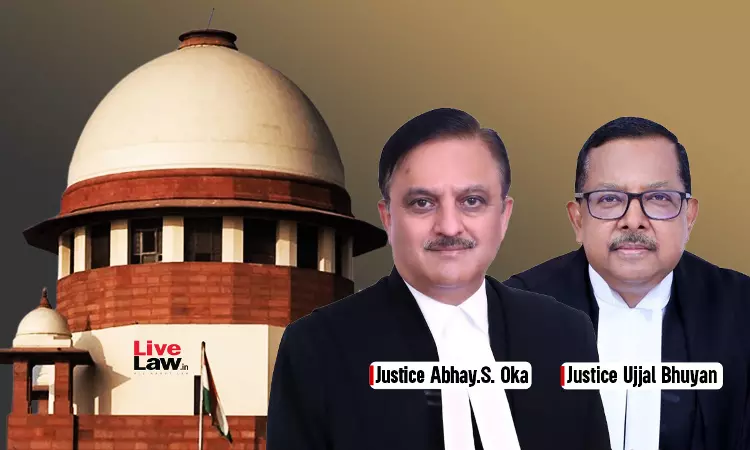- Home
- /
- Top Stories
- /
- Supreme Court Directs States, UTs...
Supreme Court Directs States, UTs To Comply With Directions On Remission Policy And Procedures Withing Two Months
Amisha Shrivastava
1 May 2025 10:13 AM IST
The Supreme Court has directed all States and Union Territories to submit affidavits within two months reporting compliance with its directions to adopt or implement an exhaustive policy on premature release, ensure automatic consideration of eligible convicts under such policy, impose reasonable conditions for remission, record reasons for grant or rejection, and not cancel remission...
The Supreme Court has directed all States and Union Territories to submit affidavits within two months reporting compliance with its directions to adopt or implement an exhaustive policy on premature release, ensure automatic consideration of eligible convicts under such policy, impose reasonable conditions for remission, record reasons for grant or rejection, and not cancel remission without hearing the convict.
The Court issued these directions in its judgment dated February 18, 2025, on the grant of premature release under Section 432 of the CrPC, 1973 and Section 473 of the Bharatiya Nagarik Suraksha Sanhita, 2023.
A bench of Justice Abhay S. Oka and Justice Ujjal Bhuyan further clarified that ongoing efforts by States to comply with these directions should not delay the processing of remission cases.
“We make it clear that even if the States have initiated the process of making compliance with the order dated 18th February, 2025, pending the completion of process, the cases of those who are entitled to be considered for premature release shall be processed in accordance with the existing regime and the fact that compliance is being made with the directions issued by this Court will be no ground to delay the procedure in these cases”, the Court held.
Amicus curiae senior advocate Liz Mathew informed the Court that she had received compliance reports only from States of Nagaland, Andhra Pradesh, and Punjab. The State of Uttar Pradesh had filed an application seeking an extension of time.
The amicus submitted a chart titled “Details of Compliances to be done by State,” which highlighted five compliance parameters for States. The Court directed that those details be included in the compliance affidavits to be filed within two months –
Remission Policy: States have to have an exhaustive policy on premature release as per Section 432 CrPC or Section 473 BNSS. The policy should ensure that cases of all eligible convicts are considered without requiring a specific application. The February 18 judgment stated that if there is no policy or regulation, the exercise of the power under Section 432 might be arbitrary. Therefore, all States and Union Territories that do not have an exhaustive policy were directed to frame one within two months.
Remission Conditions: The conditions imposed in orders granting remission have to be reasonable, capable of being performed, and not so oppressive or vague as to render the remission order ineffective. The February 18 judgment detailed various factors that must be considered before imposing such conditions, including the nature of the offence, motive, criminal background, public safety, and impact on victims.
Remission Order: The States have to indicate whether orders granting or refusing remission contain brief reasons, are communicated to convicts, and forwarded to the concerned District Legal Services Authorities. The prison authorities also have to inform convicts about their right to challenge rejection orders.
Remission Cancellation: Remission orders must not be withdrawn or cancelled without affording the convict an opportunity to be heard and that such orders contain brief reasons, as held in the judgment in Mafabhai Motibhai Sagar v. State of Madras.
Convict Data: States have to furnish data on the number of convicts eligible for premature release, those at the stage of document collection, the status of recommendations by Advisory or Sentence Review Boards, and the final orders passed by the State Governments.
The Court accepted a suggestion made by NALSA for amending Clause 2.2.6 of the Standard Operating Procedures (SOPs) on premature release, parole, and furlough for Under Trial Review Committees (UTRCs). The existing clause stated that the Secretary of the DLSA should consider “convicts who have undergone their sentence or are entitled to release because of remission granted to them.”
NALSA recommended that this be substituted with: “Convicts who have undergone their sentence, or are entitled to be considered for pre mature release, or are entitled to release pursuant to remission already granted to them.”
The amendment expands the scope of prisoners to be considered by District Legal Services Authorities for release under the NALSA SOP by including not just convicts who have completed their sentence or already been granted remission, but also those who are eligible to be considered for premature release as per applicable policy.
The Court further directed NALSA to make a corresponding modification in paragraph 1.2 of Step 1 in Part-I of the SOP. Step 1 requires prisons to report data of undertrials and convicts, including details such as FIR number, date of conviction, duration and nature of sentence, total remission earned, date of completion of sentence, reason for non-release, and whether the case has been considered by the Sentence Review Board.
The following category for reporting has been added to Step 1 as Category No. 15: “The prisoners who are entitled to be considered for grant of premature release.”
The Court kept the matter on July 25, 2025, to consider the compliance reports of the States.
Case no. – Suo Moto Writ Petition (Criminal) No. 4/2021
Case Title – In Re Policy Strategy For Grant Of Bail



